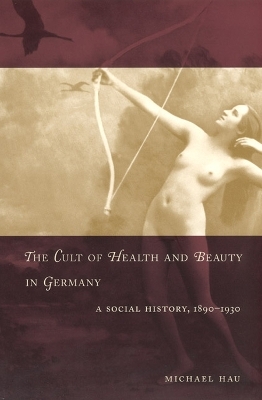
The Cult of Health and Beauty in Germany
A Social History, 1890-1930
Seiten
2003
University of Chicago Press (Verlag)
978-0-226-31976-6 (ISBN)
University of Chicago Press (Verlag)
978-0-226-31976-6 (ISBN)
Examining the life reform movements of early 20th century Germans, and the obsession with perfect health and beauty, Micahel Hau demonstrates why so many people were drawn to aesthetic ideals and their impact on German society and medicine.
From the 1890s to the 1930s, a growing number of Germans began to scrutinize and discipline their bodies in a utopian search for perfect health and beauty. Some became vegetarians, nudists or bodybuilders, while others turned to alternative medicine or eugenics. In "The Cult of Health and Beauty in Germany", Michael Hau demonstrates why so many men and women were drawn to these life reform movements and examines their tremendous impact on German society and medicine. Hau argues that the obsessions with personal health and fitness was often rooted in anxieties over professional and economic success, as well as fears that modern industrialized civilization was causing Germany and its people to degenerate. He also examines how different social groups gave different meanings to the same hygienic practices and aesthetic ideals. What results is a penetrating look at class formation in pre-Nazi Germany that should interest historians of Europe and medicine and scholars of culture and gender.
From the 1890s to the 1930s, a growing number of Germans began to scrutinize and discipline their bodies in a utopian search for perfect health and beauty. Some became vegetarians, nudists or bodybuilders, while others turned to alternative medicine or eugenics. In "The Cult of Health and Beauty in Germany", Michael Hau demonstrates why so many men and women were drawn to these life reform movements and examines their tremendous impact on German society and medicine. Hau argues that the obsessions with personal health and fitness was often rooted in anxieties over professional and economic success, as well as fears that modern industrialized civilization was causing Germany and its people to degenerate. He also examines how different social groups gave different meanings to the same hygienic practices and aesthetic ideals. What results is a penetrating look at class formation in pre-Nazi Germany that should interest historians of Europe and medicine and scholars of culture and gender.
Michael Hau is a lecturer in modern European history at Monash University in Australia.
| Erscheint lt. Verlag | 3.6.2003 |
|---|---|
| Sprache | englisch |
| Maße | 15 x 23 mm |
| Gewicht | 454 g |
| Themenwelt | Geschichte ► Teilgebiete der Geschichte ► Kulturgeschichte |
| Geschichte ► Teilgebiete der Geschichte ► Sozialgeschichte | |
| Sozialwissenschaften | |
| ISBN-10 | 0-226-31976-8 / 0226319768 |
| ISBN-13 | 978-0-226-31976-6 / 9780226319766 |
| Zustand | Neuware |
| Haben Sie eine Frage zum Produkt? |
Mehr entdecken
aus dem Bereich
aus dem Bereich
der stille Abschied vom bäuerlichen Leben in Deutschland
Buch | Hardcover (2023)
C.H.Beck (Verlag)
23,00 €
vom Mittelalter bis zur Gegenwart
Buch | Softcover (2024)
C.H.Beck (Verlag)
12,00 €


